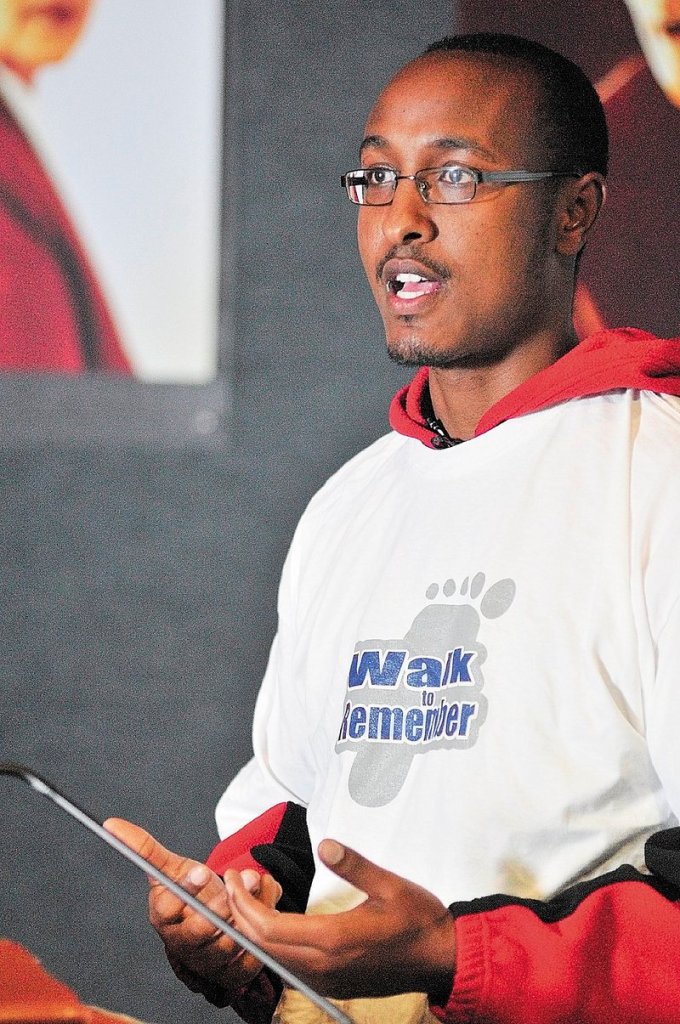AUGUSTA – Juste Tresor Gatari remembers huddling in a group of family and neighbors, confused by what was happening around him. Gatari, just 7 years old at the time, was among those ordered to move when soldiers divided the group in half. A family friend pulled Gatari back into his original group moments before soldiers led away those with whom Gatari had been standing.
“From then on, I never saw them,” Gatari said.
Gatari, now a senior at the University of Maine at Augusta, shared his account during Saturday’s Walk to Remember at the university’s Holocaust & Human Rights Center. The second annual walk was held to commemorate the 1994 Rwandan genocide that left nearly 1 million people dead.
“The more time you think about it, the better it gets,” Gatari said. “I believe in forgiveness.”
Gatari organized the first walk last year to help people understand what happened during the genocide, which has largely been forgotten in the west. After a 45-minute group walk around campus, the center showed “As We Forgive,” a documentary on the struggle that has existed since roughly 50,000 confessed killers who took part in the genocide were released from Rwanda’s overwhelmed prisons and now are trying to rejoin the communities where family members of the victims continue to live.
The Rwandan genocide led to the deaths of 800,000 people between April and June 1994. The violence was primarily carried out by extremist Hutus who used everything from guns to farm implements to murder ethnic Tutsis and moderate Hutus who spoke out against the violence.
Another half-million Tutsi women and girls were raped, according to humanitarian watchdog groups. As a result, about 10 percent of Rwandans have HIV, the virus that causes AIDS.
Gatari said the other members of the group from which he had been pulled were led away and murdered. The group into which he was pulled was spared because the soldiers believed they were Hutus. A few days later, soldiers from the Rwandan Patriotic Front, a rebel group comprising Tutsi refugees, took Gatari and those he was with to safety.
“We were on the list of people to be rescued, but they were late,” Gatari said. “They took everyone who was left behind.”
Gatari, like the people depicted in the documentary, continues the process of forgiveness. At first the pain and anger were overwhelming, but they have eased as he has focused his attention elsewhere than on the wrong done to him.
As he and other victims are learning to forgive, Gatari said, it is important to remember what happened so the circumstances that led to the genocide will never be repeated. “Both feed off each other,” he said.
Gatari, who plans to study at Northeastern University in Boston, was drawn to UMA by its architecture program.
Eric Habineza followed Gatari to UMA. “I don’t consider myself a survivor of the genocide,” Habineza said.
Habineza, who was 3 at the time, escaped Rwanda with his parents about a week before the genocide began. They fled to the Congo, where his parents survived a murder attempt.
Habineza remembers nothing of the turmoil and tragedy, but the deep emotional and physical wounds inflicted on his friends and family smothered him as he grew up.
“To say that the genocide didn’t affect me would be a lie,” Habineza said. “It’s a part of Rwanda. I’m part of the next generation. How do we reconcile survivors and perpetrators?”
Talking about the genocide is taboo in Rwanda because the guilt and anger is still so raw, Habineza said.
“If your parents killed other people you have guilt that comes down on you,” he said. “If you’re a Tutsi, you’re a victim. If you’re a Hutu, your family killed mine. Eight hundred thousand is just a number, but those are mothers and fathers and children.”
Kennebec Journal Staff Writer Craig Crosby can be contacted at 621-5642 or at:
ccrosby@centralmaine.com
Copy the Story Link
Send questions/comments to the editors.



Success. Please wait for the page to reload. If the page does not reload within 5 seconds, please refresh the page.
Enter your email and password to access comments.
Hi, to comment on stories you must . This profile is in addition to your subscription and website login.
Already have a commenting profile? .
Invalid username/password.
Please check your email to confirm and complete your registration.
Only subscribers are eligible to post comments. Please subscribe or login first for digital access. Here’s why.
Use the form below to reset your password. When you've submitted your account email, we will send an email with a reset code.